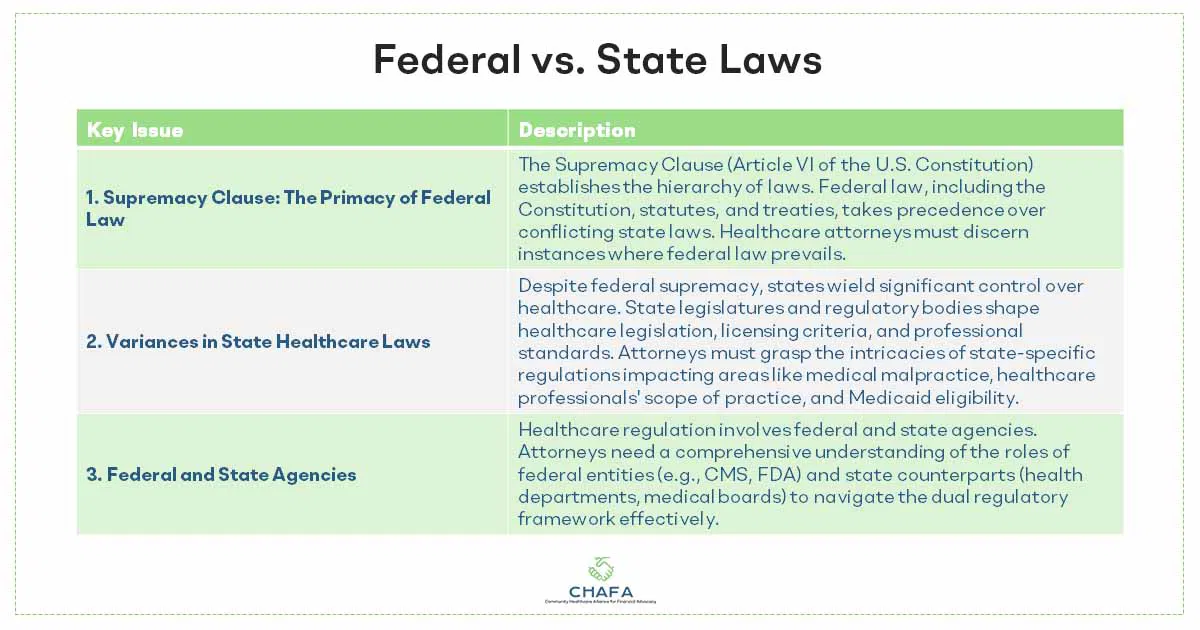Attorneys are critical in ensuring that healthcare providers, organizations, and professionals follow the intricate legal rules in the ever-changing healthcare industry. Navigating the healthcare compliance legal landscape necessitates a thorough understanding of federal and state legislation and a strong awareness of industry standards and best practices.
As new technologies, legislation, and policies transform the healthcare industry, attorneys must stay current to provide effective assistance.
Overview of Healthcare Laws and Regulations
Healthcare rules and regulations are the foundation of the legal framework that controls the United States’ complex and dynamic healthcare industry. These laws are intended to protect patient rights, assure the delivery of safe, effective, and ethical healthcare services, and prevent healthcare fraud and abuse within the system.
To traverse the complex legal landscape, attorneys specializing in healthcare law must have a thorough understanding of these laws.
Some of them include:
- The Affordable Care Act (ACA)
- Health Insurance Portability and Accountability Act (HIPAA)
- Anti-Kickback Statute and Stark Law
- The False Claims Act
- Emergency Medical Treatment and Labor Act (EMTALA)
Federal vs. State Laws
Navigating the intricate interplay of federal and state regulations is a key issue for healthcare attorneys. The interaction of these two levels of government creates a jurisdictional minefield that necessitates a detailed understanding to assure compliance.

1) Supremacy Clause: The Primacy of Federal Law
The Supremacy Clause, included in Article VI of the United States Constitution, outlines the hierarchy of laws, with the Constitution, federal statutes, and treaties serving as the ultimate law of the land.
This means that when federal and state laws clash, federal law takes precedence. Healthcare lawyers must be skilled at determining when federal law takes precedence over competing state laws.
2) Variances in State Healthcare Laws
Despite the preeminence of federal law, states retain enormous control over healthcare within their borders. State legislatures and regulatory agencies have a significant impact on healthcare legislation, licensing requirements, and professional standards.
Attorneys must understand the complexities of state-specific regulations, which can vary greatly and impact issues such as medical malpractice, the scope of practice for healthcare professionals, and Medicaid eligibility.
3) Federal and State Agencies
Healthcare regulation is overseen by agencies in both the federal and state governments. Attorneys must comprehend the duties of federal authorities such as the Centres for Medicare & Medicaid Services (CMS) and the Food and Drug Administration (FDA), as well as state health departments and medical boards, to negotiate the dual regulatory structure.
The Impact of Telehealth on Healthcare Compliance
Telehealth has transformed the healthcare environment, giving patients easy access to medical treatments. During the COVID-19 pandemic, telehealth usage grew substantially, with over 52 million telehealth visits occurring in 2020 compared to only 840,000 visits in 2019.
However, this did not come without new problems and challenges for healthcare practitioners.
Understanding the implications of telemedicine is essential for healthcare compliance attorneys.
One of the most pressing concerns in telehealth is ensuring patient information is protected in line with the Health Insurance Portability and Accountability Act (HIPAA). To protect patient privacy, telehealth platforms, and communication channels must comply with stringent criteria. Attorneys must advise healthcare providers on how to deploy secure telehealth technology and procedures such as encryption and secure data transmission.
Telehealth often involves the delivery of healthcare services across state lines, which raises complicated licensing difficulties. Attorneys must understand the regulatory frameworks that regulate healthcare provider licensure in each state. The Interstate Medical Licensure Compact and similar programs try to make the process more efficient, but legal professionals must stay up to date on developments and guarantee their clients conform with state-specific licensing regulations.
Data Privacy and Security in Healthcare
Given the delicate nature of patient information and the industry’s increasing reliance on digital technologies, data privacy and security in healthcare are essential. Healthcare compliance attorneys play a key role in navigating healthcare institutions through the complicated environment of data protection rules, protecting patient privacy, and mitigating the risks associated with data breaches.
Healthcare attorneys must assist healthcare organizations in the implementation and maintenance of secure EHR (Electronic Health Records) systems. To protect patient data, access limits, audit trails, and encryption methods must be addressed.
Because of the significant value health data holds, the healthcare industry is a popular target for cyberattacks. Attorneys must collaborate with healthcare providers to implement strong cybersecurity safeguards. This involves frequent risk assessments, personnel training on security best practices, and the adoption of data-protection technology like as firewalls and intrusion detection systems.
Aside from federal requirements such as HIPAA, healthcare organizations must traverse a constantly changing labyrinth of state-specific data privacy laws. Attorneys must stay current on state laws that may impose extra requirements or standards for the protection of health information. Compliance measures should align with both federal and state regulations.
Emerging Issues in Healthcare Law
Healthcare law is a constantly evolving discipline that addresses new difficulties, technologies, and societal requirements. To provide efficient legal assistance to their clients, attorneys specializing in healthcare law must remain sensitive to new challenges. These include:
- Telehealth regulation and expansion
- Digital health and health tech regulations
- Value-based care and alternative payment models
- Drug pricing and access
- Mental health law
- Public health emergencies
In conclusion, healthcare compliance is a dynamic and complicated sector that requires legal professionals’ attention and skill. Armed with the right information, attorneys can play an important role in preserving the healthcare system’s integrity and legality. Connect with CHAFA to learn more about healthcare compliance’s and how we can assist you in this journey.

